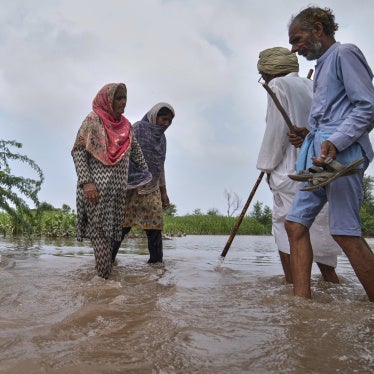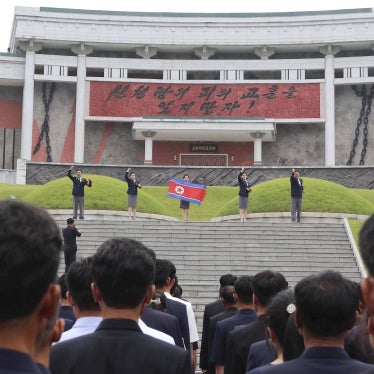(New York) - The Bangladeshi government should charge or release members of Bangladesh's border guards who have been held since the massacre of senior army officers and others a year ago, Human Rights Watch said today.
On February 25 and 26, 2009, members of Bangladesh's border guards, the Bangladesh Rifles (BDR), rebelled against their commanding army officers, killing more than 70 people. The government responded with mass arrests of BDR members. Of the approximately 2,100 still in detention, the majority have not been charged.
"The massacre was a tragedy and the perpetrators should be brought to justice," said Brad Adams, Asia Director at Human Rights Watch. "But the government has had enough time to decide who to charge and who to release. The time has come to end this collective punishment and only detain those for whom there is credible evidence."
Six BDR tribunals have been established to try BDR members accused of mutiny. A few hundred mutiny suspects are currently on trial before BDR tribunals. These tribunals have not completed any trials, but human rights workers monitoring the trials and family members alleged that they are not meeting fair trial standards. Family members of some of the accused say that they have not been allowed to be present during hearings. Human rights workers monitoring the trials say that lawyers have not been allowed to cross-examine witnesses and that confessions obtained through torture have been used.
Individuals alleged to have committed other crimes in connection with the rebellion, including murder, rape, and arson, will be tried under the penal code by special civilian courts. Trials by the civilian courts have not started. In pretrial hearings, many detained border guards have told courts that they were tortured to confess to their involvement in the rebellion.
Human Rights Watch also expressed grave concern about the treatment of detainees. NGOs and journalists have reported that more than 60 BDR members have died in custody or in the BDR barracks since the massacre. The authorities have often cited heart attacks and suicides as the cause of death. Family members, hospital staff, and human rights workers have, however, in several cases alleged that the bodies of the deceased had wounds and bruises indicating that they had been tortured before dying. Some told Human Rights Watch that when visiting detained BDR members after interrogation, they have found them severely wounded and in such bad physical condition that they have been unable to walk and speak properly.
The wife of a BDR deputy assistant director arrested in April 2009 told Human Rights Watch that after his arrest her husband was subjected to electric shocks on his head and genitals; his toenails were pulled out; and he was beaten with sticks all over his body. Two weeks after his arrest, his body was still so bruised and swollen that his wife could hardly recognize him. His toes were still bleeding and he was unable to speak. Several months later, he was still unable to speak coherently and see properly.
In May 2009, Bangladesh's government established a commission of inquiry to look into allegations of illegal deaths in custody. The commission submitted a report in October 2009, but it has not been made public. Media reports suggest that the commission recommended further investigations into some deaths. To date, no one is known to have been prosecuted for any of the killings or acts of torture.
"There is strong evidence that suspects have been tortured and killed in custody," said Adams. "The government should prosecute those responsible. For reasons of transparency and accountability, it should also make the inquiry commission's report public."








